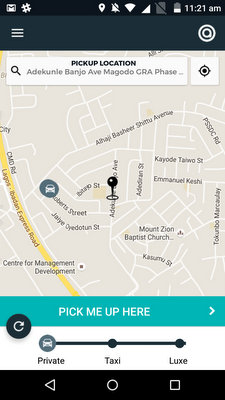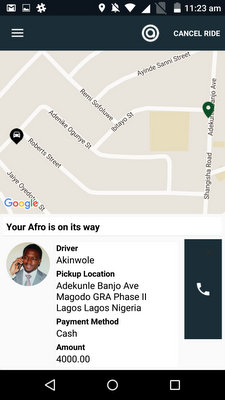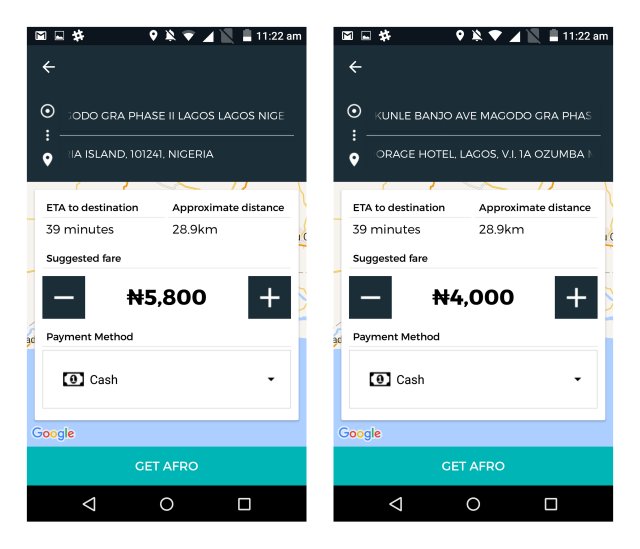As it turns out, I have never written about Afro, an online taxi startup that made its debut in April of 2014. Not because I was not aware of it. Somehow I just never got round to it. Before this post, the only article about Afro that existed on TC was penned by Afro’s new GM at a time when the startup was supposed to be making a comeback. A second impression, as Aniedi Udo-Obong described it, in May 2015. Aniedi had just tapped to lead a one-year-old e-hailing service that nobody I knew had actually used.
But it wasn’t going to be a smooth drive from there. Afro still had a long way to go as a product. I remember trying to interact with the app a few times and giving up because I couldn’t bear to see it in such a broken state.
And up till a few days ago, I did not consider Afro a real product, not until Aniedi insisted that I try it. I thought it was interesting because for some reason, he didn’t pressure me to try the app last year. Could it be because he now had a lot more confidence in the product than he did back then? Perhaps the third time was the charm?
Like we say in Nigeria — “no problem”. I downloaded Afro.
Let’s do this
Compared to the how l remembered it, the Afro app got a lot better. A whole lot better. It’s not quite Uber-good. It is more like a “it works” kind of good. But it is more than I could say for the previous iteration I was acquainted with. The location marker zoned in on my exact location. The Google Maps API integration didn’t screw up. There seemed to be cabs available in my vicinity. So far so good.

Later that afternoon, when I’m ready to head out, I run into the first snag. All the cabs from earlier that day have vanished. I am on the Lagos mainland, and need to get to Victoria Island within the hour. Five minutes later, there still are no cabs in any of the three categories the service offers.
Ten more minutes pass.
“Screw this”.
I call an Uber and go to Victoria Island.
Of course, this is not the app’s fault. At least not directly. The app might work, but if there are no drivers to accept your hail, then the whole enterprise is pointless. Afro is only just trying to find its feet again, so it’s understandable that they don’t have cabs swarming every square block of the city. Uber used to have that problem, but except you hang out in some really far-flung nook, it’s far less acute these days.
Even so, understanding this didn’t make it any less galling. When I brought it up with Aniedi, he acknowledged that they aren’t quite there yet.
“Beyond the changes to the app and the “back-end”, we are working tirelessly on service delivery and ride fulfilment”, he said.
Right now, Afro is still acquiring drivers. If things go as planned, cab availability should go up, and hailing ETAs down.
Anyways, by now, I’m done with my meeting at the Radisson Blu, and I’m ready to head back to the mainland. This time, my luck is much better. It would seem that what drivers are currently signed up to the Afro service like to cluster on the Island. Finally, some action.
Let’s ride
Again, I can’t help noticing how un-Uberlike the experience is. Not that it needs to look like Uber. It’s just that Uber’s UX is smooth, and launch to hail happens in a few taps…
Okay, I’m gonna stop with the Uber comparisons now. But it is in fact a great time to point out a key difference from Uber that Afro likes to play up a lot. Afro’s most touted value proposition is that you are able to adjust your fare in advance. Personally, I’m not buying it, I think it’s a bug, not a feature. But apparently, we accept that Nigerians like to haggle, and the price slider/editor sates that psychological need. Welp.
The real problem with the price slider would arise in the not-so hypothetical situation where a rider has plans on making more than one stop. If Afro locks in the price from the beginning of the ride, what then? You have to start all over every time you make a pit stop? I do multiple destinations in Uber all the time, because Uber doesn’t force you to set a destination. It merely calculates based on distance and time. It looks like I couldn’t avoid another Uber comparison afterall. If a lot of riders are like me, then Afro hasn’t really thought this one through.

Anyways, thankfully, I’m headed straight to the office and no place else. My ride shows up in a few minutes. I get in. There’s a bit of confusion as to where exactly I’m headed (he said my destination sounded like somewhere on Lagos Island, and he tried to renegotiate the price, heh). But he was an amiable enough chap. His car was clean, and the ride was good. We reached my final destination, and I paid cash.
Trip over. I would rate it a 6.
Afro, is officially, for the first time in its two-year life, in business.
Complete overhaul
It’s been a rather bumpy two years for Afro, formerly known as Afro Cab. The first iteration launched with a mild splash, and lots of free coupons were handed out. But the service failed to gain any apparent traction because the app, in my opinion, was a technical write-off. I remember not being able to recover the account I created at the time because there was no “forgot password” function to be seen. It was that bad.
After an executive reshuffle that saw a lot of the founding execs leave the company, Afro attempted to reinvent itself. Aniedi, who was CTO at the time was moved up to oversee the whole of the re-branded Afro. One of the bigger things Aniedi has done is to bring the app’s development back to Lagos. Whatever tech they had licensed previously was just no good.
The result is a service that works dependably. There are now 400 and counting drivers signed up to the platform. The app is available on iOS, Android, BlackBerry and mobile web, with a robust selection of payment methods. When Afro embarks on its new wave of marketing, the users that decide to try it will hopefully not be disappointed.

The road ahead for Afro is still long and windy. When you share a market with a 400 pound gorilla like Uber, you don’t make a hammock and lie down. If Afro is to live long and prosper, the training wheels have to come off.




















